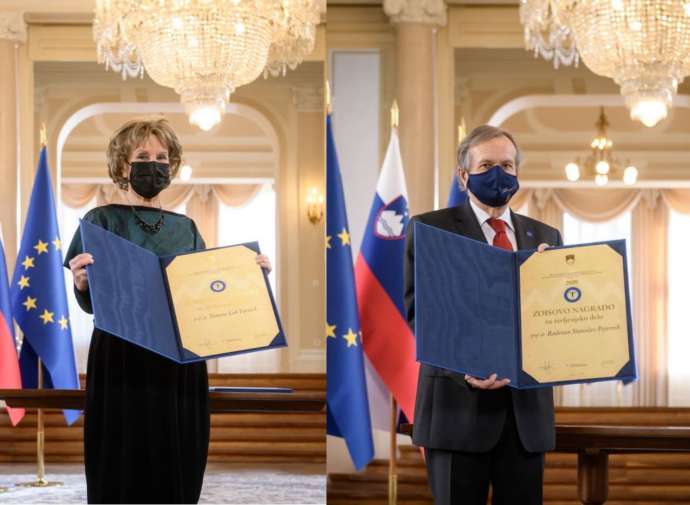STA, 2 December 2020 - This year's Zois Prizes for lifetime achievement in science and research have been bestowed on researcher Tamara Lah Turnšek of the National Institute of Biology and University of Ljubljana professor emeritus Radovan Stanislav Pejovnik. The recipients were presented in a documentary showed on TV Slovenija last evening.
Lah Turnšek has been striving for a comprehensive approach to scientific work. Her breakthrough discovery of a protease enzyme named cathepsin S early on in her career has been followed by biomedical studies focusing on inflammatory processes and cancer, the justification reads.
Currently, she is researching malignant brain tumours. Lah Turnšek has been working with Slovenian as well as foreign research or medical institutions and striving to promote science in the public.
She has also paved the way for women in her field and has been fighting for equality of opportunities.
Pejovnik is a researcher and professor who has left an indelible mark in sintering theory or liquid phase sintering, core technology for coming up with ceramic products, such as bricks or highly complex electrical engineering components.
Almost 30 years ago he gathered a group of young people around him to launch a pioneer study into lithium batteries. Slovenia is one of the leading countries in this field also due to his efforts, the justification reads.
This year's Puh Prize for lifetime achievement went to researcher Janez Trontelj, the doyen of Slovenian microelectronics studies and the head of a microelectronics lab at the Ljubljana Faculty of Electrical Engineering.
He has been running the designing of microelectronics circuits for more than 50 years and has contributed to a number of Slovenian companies making a name for themselves abroad.
An honour called Ambassador of Science of the Republic of Slovenia was also conferred. This year's recipient is Boštjan Kobe, professor of structural biology at the University of Queensland in Australia and a member of the Australian Academy of Science.
He has been researching the role of the proteins' spatial structures in the immune system response of animals and plants and is widely acclaimed in the international scientific community. Kobe has also been cooperating with researchers in Slovenia.
The documentary, which showcased this year's recipients, also featured President Borut Pahor, who stressed that these accolades were Slovenia's top honours in science, thanking the recipients for their efforts and accomplishments.
Pahor noted that Slovenian scientists were gaining prominence abroad and warned that it was key to attract them back home or at least maintain ties with them.
He pointed out that there was not enough research funding in Slovenia and urged a re-think on that since science, he believes, is key for our future.







